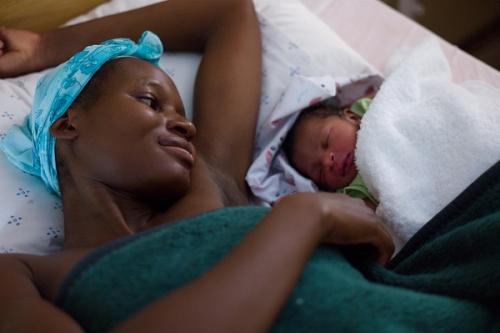Investing in early childhood development essential to helpig more children and communities thrive
249 million children under five are at risk of not reaching developmental potential, implementing low-cost interventions could reverse this trend
An estimated 43 per cent—249 million—of children under five in low-and middle-income countries (LMICs) are at an elevated risk of poor development due to extreme poverty and stunting, according to findings from The Lancet’s new Series, Advancing Early Childhood Development: from Science to Scale.

A mother with her newborn baby recovers in a postnatal ward at the Shakawe clinic in the village of Shakawe in Botswana on November 29, 2010.
The Series reveals that early childhood development interventions that promote nurturing care—health, nutrition, responsive caregiving, security and safety, and early learning—may cost as little as 50 cents per child per year, when combined with existing services such as health. The World Health Organization, the World Bank, and UNICEF contributed to and offered guidance to the Series.
The findings in this Series underscore the importance of increased global commitment to early childhood development. Individuals are estimated to suffer a loss of about a quarter of average adult income per year, while countries may forfeit up to as much as two times their current GDP expenditures on health or education. Consequences of inaction impact not only present but future generations.
“We now know how high the cost of inaction is, and new evidence makes clear that the time to act is now. We hope the evidence in this Series will help countries reach more pregnant women and young children with preventive and promotive services that have the potential to drastically improve developmental outcomes for children as well as their adult health, wellbeing, and economic productivity,” said Series co-author, Professor Linda M. Richter, PhD, DST-NRF Centre of Excellence in Human Development, University of the Witwatersrand, Johannesburg, South Africa.
Research shows that a child’s brain develops faster in the first 2-3 years than at any other time in life. These early years are also a critical period of adaptability and responsiveness to interventions. When young children are deprived of nutrition, stimulation, and protection, the damaging effects can produce long-term detriments for families and communities.
“The science and economics are clearly on the side of investing in the first 1,000 days of a child’s life, starting with a woman’s pregnancy,” said Keith Hansen, Vice President, Human Development at the World Bank Group. “If we don’t do this, children fall behind long before they set foot in school and suffer a lifetime of disadvantage. But if we do, we can make an irrevocable difference to their ability to fully participate in the economies of tomorrow as active, productive citizens. The Lancet research is further proof, if more is needed, of just how important this agenda is.”
The authors stress the strong position of the health sector in providing an entry point for early childhood interventions—especially in support of nurturing care. The sector’s ability to access women and children during the critical period from conception through early childhood presents an opportunity to integrate low-cost interventions, such as WHO / UNICEF’s Care for Child Development, and Reach Up and Learn, into existing maternal and child health and nutrition services. These have shown to help improve the quality of nurturing care and the overall development of young children, while also giving attention to the wellbeing of the caregiver.
“The science shows us that biology is not destiny—and that what children experience in the earliest days and years of life shapes and defines their futures,” said UNICEF Executive Director Anthony Lake. “We need to turn that science into an alarm bell—because the development of millions of children is at urgent risk. Right now, 43 percent of children in low- and middle-income countries are at risk of not achieving their cognitive potential. No country can risk losing nearly half of the brain potential of its youngest citizens—low- and middle-income countries least of all.”
According to the Series authors, interventions need to be available early. “Historically, early childhood interventions have focused on children of preschool age. But we now know that interventions encompassing the period before conception through the first two years of life can greatly reduce adverse growth and health outcomes, and help ensure young children reach their full developmental potential,” said Series co-author, Professor Stephen Lye, PhD, Executive Director, Fraser Mustard Institute for Human Development, University of Toronto, ON, Canada.
The authors propose several ways the global community can scale-up support for early childhood development services by:
• Encouraging the adoption and implementation of policies to create supportive environments for families to provide nurturing care for young children.
• Building capacity and strengthening coordination to promote early childhood development through existing health, nutrition, education, social, and child protection services.
• Strengthening measurement and ensuring accountability for early childhood development services.
• Increasing research, and fostering global and regional leadership and action.
• Expanding political will and funding through advocacy for the Sustainable Development Goals (SDGs).
“Investing in young children is a moral, economic, and social imperative. The SDGs have provided a promising vision on children and adolescents’ health, but political will and increased investment in early childhood development are needed to ensure that the ambitious targets can be reached. Early childhood development will not only benefit the children of today, but will have a direct impact on the stability and prosperity of nations in the future,” said Dr Margaret Chan, WHO Director-General.
Source: United Nations Children's Fund
- 292 reads
Human Rights
Ringing FOWPAL’s Peace Bell for the World:Nobel Peace Prize Laureates’ Visions and Actions

Protecting the World’s Cultural Diversity for a Sustainable Future

The Peace Bell Resonates at the 27th Eurasian Economic Summit

Declaration of World Day of the Power of Hope Endorsed by People in 158 Nations

Puppet Show I International Friendship Day 2020

